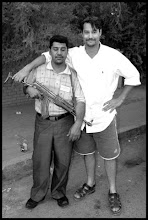The following is a sampling of articles and briefings that mention a little known group, the US Department of State Hostage Working Group, organized by the US Embassy in Baghdad in the summer of 2004 to monitor hostages in Iraq.
It is unknown if the group is looking into the disappearance of Kirk von Ackermann.
A general overview can be gleaned from a job listing posted June 22, 2005 at USAJobs.org for the Department of State:
Hostage Working Group Coordinator for IraqU.S. Hostages Kept Low Profile In Ritzy Baghdad Neighborhood
MAJOR DUTIES:
* Serves as the US Embassy's lead for identifying, tracking and monitoring non-military missing persons/hostages in Iraq. Coordinates via the State Department and, as appropriate, foreign governments on the status of missing persons;
* Provides advisory support for the planning, development, and execution of hostage negotiations within a broad and complex foreign affairs arena.
* Advises DOS, US Embassy, DOD, MNF-I, and CENTOM on all hostage-taking incidents of US citizens, coalition forces/contractors and Interim Iraqi Government (IIG) officials;
* Acts as the liaison between IA, DOD, IIG and international representatives to promote information sharing, intelligence relay and coordination via diplomatic, military, intelligence and law enforcement channels;
* Assists IA intelligence efforts by disseminating intelligence products among relevant agencies and players;
* Advises on tactics, techniques and procedures for detering, preventing and reacting to hostage incidents;
* Develops analysis of the hostage threat to personnel;
* Reviews current PR training profile for the Embassy and makes recommendations to improve and augment the current PR training for all individuals assigned to US Embassy Baghdad.
By Larry Kaplow, Cox News Service, September 9, 2004
A couple of months ago, the U.S. Embassy formed a "hostage working group" that now meets weekly to bring together officials from the FBI, the Defense Department, the State Department and the Iraqi government. Officials do not publicly discuss the actions they can take against kidnappers.Daily Press Briefing
An American coordinator of the working group, who asked for his identity to be protected, said recently that most of the information the officials receive about hostages comes from the media, primarily the threatening or gruesome videos made by the kidnappers.
US Department of State, March 7, 2006
QUESTION: There's a hostage working group in Baghdad that works towards the release of Americans. Can you describe what efforts are undertaken to seek the release of other Westerners who may be kidnapped in Baghdad?Kidnappers grab Iraqis, mostly
MR. MCCORMACK: Well, the way this works, and I'm not going to get into the details of what exactly the hostage working group does, is in the case of American citizens, clearly they're deeply involved. They're really at the center of the action and they work very closely with the Iraqi Government as well as other governments who might have helpful or useful information. In terms of other foreign nationals, when the U.S. hostage working group can offer assistance and that assistance is accepted, they do engage but we stand ready to help out other governments when they face this difficult situation. And if there's a request to us then certainly we help them out.
by Vanessa Arrington, AP, March 31, 2006
At least 13 Americans kidnapped in Iraq remain held, among at least 42 foreigners, the U.S. spokeswoman said. The cases of at least three Americans have been reported. Some of the others are believed to be Iraqi-Americans or perhaps have families who have chosen to keep the abductions private.
[...]
Data compiled by the Hostage Working Group at the U.S. Embassy shows that, on average, between 10 and 20 Iraqis have been kidnapped every day since April 2003, shortly after the U.S.-led invasion of Iraq.



